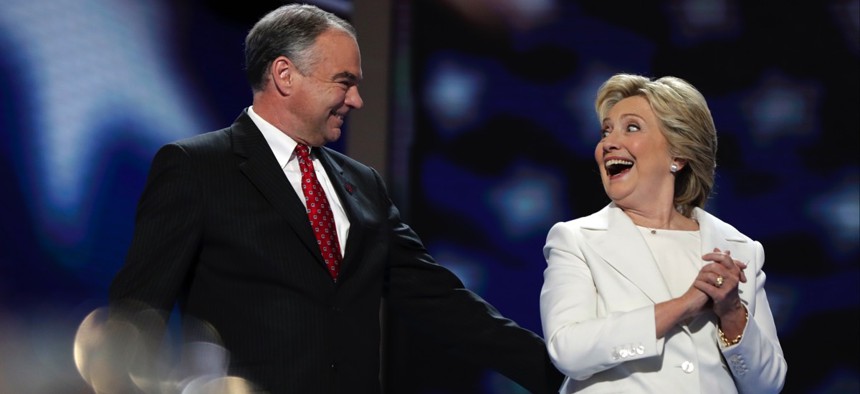Kaine, No. 2 on the Democratic Ticket, Touts His Municipal Government Experience

Democratic presidential nominee Hillary Clinton is joined by party vice presidential candidate Sen. Tim Kaine after her speech during the final day of the Democratic National Convention in Philadelphia on July 28. Matt Rourke / AP Photo

Connecting state and local government leaders
Speaking to the National Urban League, the former Richmond mayor and Virginia governor explained why the time he spent in local government has been critical to his political success as a U.S. senator.
Democratic vice presidential nominee Tim Kaine recalled his time in local government speaking before the National Urban League in Baltimore on Thursday, arguing only his party's ticket understands the challenges America’s cities face.
The U.S. senator from Virginia began his political career on the Richmond City Council and is one of only 20 people in the nation’s history to have served as a mayor, governor and senator.
Kaine credited his work in local government for his success because that’s where he learned about where to renovate schools and where to build them, neighborhood development and adopting a policing philosophy.
With African-American unemployment more than double that of whites, Kaine advocated for urban mobility networks linking black communities to good-paying jobs. He himself witnessed suburban reticence to even adopt bus systems at the local level.
“Mayors get the connection between transportation and work,” Kaine said during the opening plenary at nonprofit NUL’s 2016 Conference.
While Kaine was mayor, an NUL affiliate in Richmond oversaw a summer jobs program—critical to many people starting a career and getting out from under the poverty line. Alleviating poverty is the reason Kaine said he supports investing hundreds of billions of dollars into communities using the 10-20-30 funding approach, pioneered by South Carolina Rep. Jim Clyburn with the 2009 American Recovery and Reinvestment Act.
That method directs at least 10 percent of rural development investments to communities where 20 percent or more of the population has lived below the poverty line for 30 years. And Democratic presidential nominee Hillary Clinton wants to extend that to urban, American Indian and coal country communities as well, Kaine said.
“We have to focus our resources in the areas where they will do the most good,” Kaine said.
Kaine also addressed corrections, calling for action in an “era of mass incarceration” involving the commuting of sentences for nonviolent drug offenders, as well as making jobs and support available to inmates once they’re out.
Training was one of the first things cut from local budgets during the last recession, Kaine said, but renewed investment is needed to teach law enforcement officers to prevent crime through community policing, rather than fighting it. A “dangerous” distance exists between some communities and police forces that gets suspects killed, occasionally in police custody, he added.
For this Kaine prescribed making independent data collection a priority to assist investigations and prosecutions of officer-involved shootings.
“We have got to rebuild the bonds of trust between law enforcement and the communities they serve,” Kaine said. "This is something that across the nation is spotty.”
Kaine painted his and Clinton’s knowledge of the issues plaguing cities, particularly social justice, in stark contrast to Republican presidential nominee Donald Trump.
Three years after Kaine’s father-in-law, former Virginia Gov. Linwood Holton, desegregated the state’s schools in 1970, Kaine said, the U.S. Department of Justice sued Trump’s father for refusing to rent apartments to African Americans—thanks to testing work done by NUL.
Trump was invited to speak at the conference, said NUL President Marc Morial, but like former Republican presidential nominee Mitt Romney in 2012 declined to even send a proxy.
The theme of the conference was #SaveOurCities, which Baltimore Mayor Stephanie Rawlings-Blake asserted was “not a cry for help” but “a rallying call” to improve vulnerable populations’ educational and job opportunities.
Retiring Democratic U.S. Senator Barbara Mikulski, the longest-serving woman in congressional history, said the goal was ensuring “the ZIP code you’re born in does not determine your destiny” and briefly touched on Clinton’s plan for urban infrastructure and the jobs it could create.
“Stephanie Rawlings-Blake could use $3 billion a year just to rebuild the Baltimore water infrastructure and to build our Howard Street tunnel for the railroad port job,” she said, adding that “$3 billion a year and we could put over 40,000 people to work for the next six years.”
Dave Nyczepir is a News Editor at Government Executive’s Route Fifty and is based in Washington, D.C.

NEXT STORY: Route Fifty Roadmap: A Municipal Parks and Rec Facility With Olympic Stature





